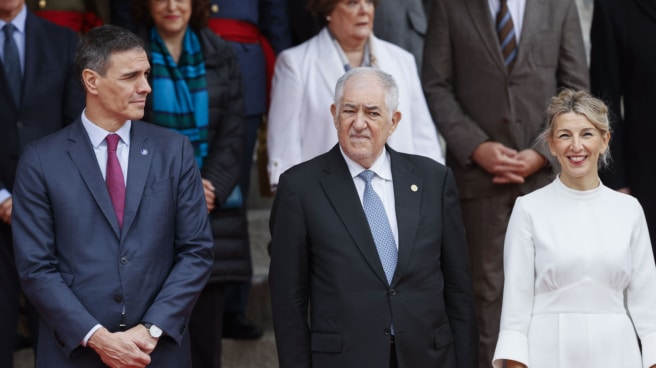

Prime Minister Pedro Sánchez, President of the Constitutional Court Candido Conde-Pompidou and Minister of Labor Yolanda Díaz during the parade of troops after the inauguration of the XV Legislative Assembly
The Constitution is turning forty-five years old in a very critical context. Political polarization and institutional degradation have reached their climax. very alarming level. We can say without any exaggeration that the Constitution is in crisis. Now the text of the Constitution, which has stood up very well and successfully passed numerous tests, is not responsible for this crisis: the abdication of King Juan Carlos I, repeated elections due to the impossibility of appointing a government president, destructive votes of censure. and two coup attempts (one military in 1981 and another civilian in 2017). It is therefore worth emphasizing that the constitutional crisis we are suffering from is not caused by the supposed obsolescence of constitutional rules, but by the flawed, incorrect and, in many cases, fraudulent application of these rules by political parties. What happened with the Constitutional Court is a good example of this. The constitutional design of the Constitutional Court, provided for in Article 159, has not undergone any changes. The same commandment allowed, thanks to the constitutional loyalty of the UCD and PSOE, to ignite constitutional Court which included some of the best lawyers in the country, who, regardless of their ideology, were always distinguished by their independence of judgment and absolute neutrality. With this same article we reached the current Constitutional Court, the prestige and authority of which are in great question due to the obvious political-party affiliation of the majority of its members. The PP and PSOE, using the disastrous quota system, proceeded to distribute posts in the said court. (and in other constitutional bodies), thereby humiliating the institution and seriously undermining its authority. In fact, the Constitutional Court, which only makes sense as an anti-majoritarian institution and protector of minorities, is today merely a reflection of the governmental majority. How did we get into this sad situation?
A perverted procedure of direct election has been introduced and thus the leaders thus elected become the new leaders of our time.
The cause of the constitutional crisis lies in the political parties, whose plebiscitary-Caesarist structure contradicts the logic of representative democracy. This logic aims to ensure that there are no unfettered powers, and for this reason leaders should never be elected directly by the members, but rather through representative bodies. The bodies that elect constantly monitor and, if necessary, can also dismiss said leaders. Instead, a perverted procedure of direct elections was imposed and thus the leaders thus elected become the new leaders of our time. By appealing to these direct elections, they reject all control on the part of the representative bodies of the party, reducing them to the needy state of approval meetings of the leader.
In this context, The parties violated two basic rules of constitutional democracy: tolerance and self-sufficiency. Rules without which constitutional democracy is unlikely to survive in the long term. The rule of mutual tolerance prevents us from considering the enemy as an enemy and forces us to recognize equal legitimacy of government. This leads to viewing political change as something normal. Unfortunately, in Spain the enemy is “demonized” and his legitimacy is denied. The metaphor used by the Prime Minister, who defends the need to build a “wall” against the opposition, is quite indicative.
The parliamentary majority intends, through the amnesty law, to prevent judges from performing their functions in trying crimes
The rule of self-restraint was also violated. This rule prevents parliamentary majorities or government powers from being used to control other institutions and subject them to the will of the majority. What happened in the Constitutional Court is also a good example here: The government exercised its powers and appointed two judges, including two members of its administration.. And the parliamentary majority intends, through the amnesty law, to prevent judges from fulfilling their function of considering crimes.
The constitutional crisis affects almost all institutions, with only the Crown and the judiciary keeping their institutional prestige and dignity intact. Overcoming the crisis will only be possible thanks to a broad agreement between the PP and the PSOE, the support parties of the system, which revises the constitutional pact born forty-five years ago, reaffirming the commitment of both to the fundamental rules of democracy: tolerance. and self-sufficiency.
Javier Tajadura Tejada is a professor of constitutional law at the University of the Basque Country.
Source: El Independiente